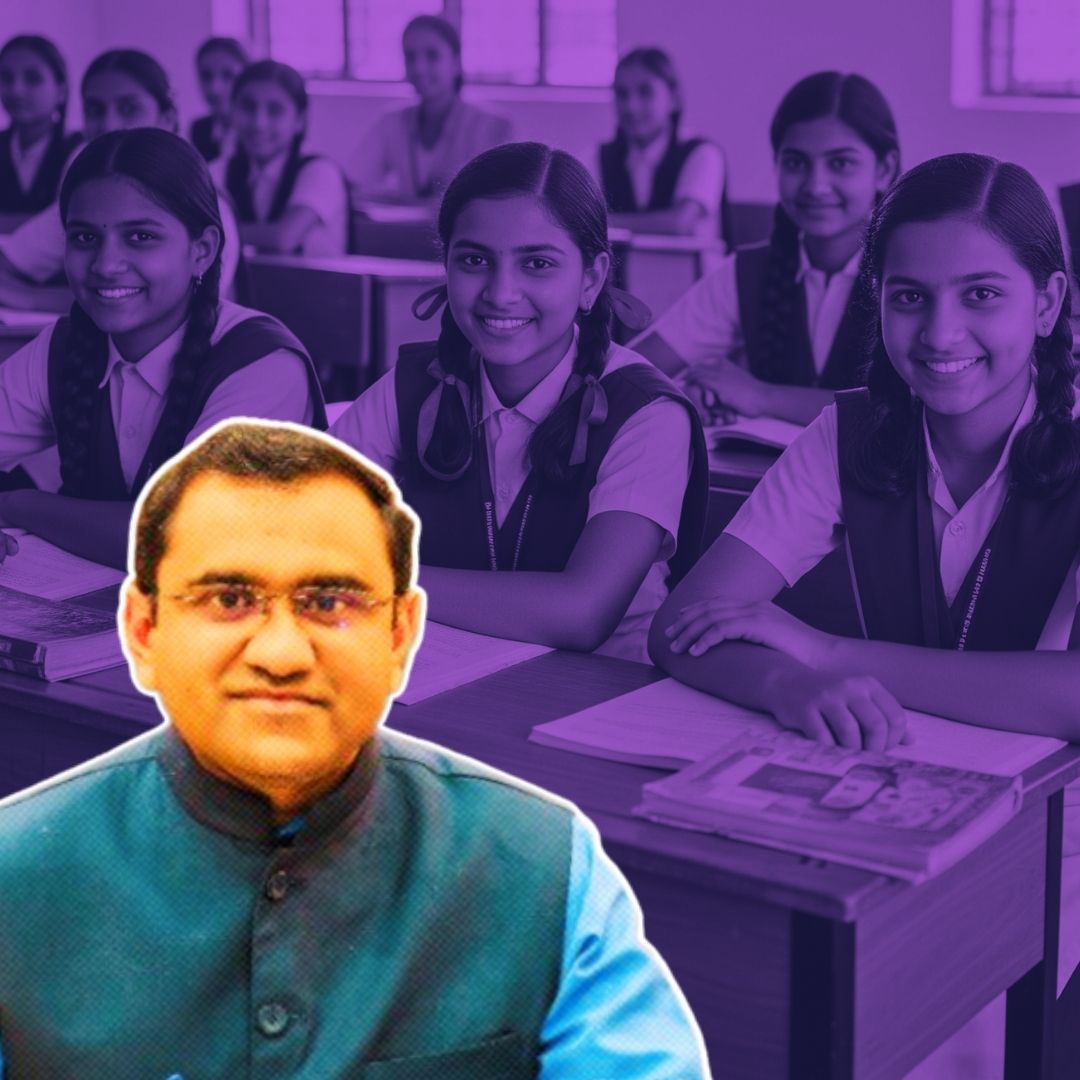Tripura has achieved 100% literacy, but the state remains among India’s top three for child marriage, with 40.1% of girls affected. In South Tripura, a forgotten school club called Balika Manch—revived by IAS officer Saju Vaheed—has become a lifeline for hundreds of girls, preventing child marriages and helping them return to school.
Through community-driven action, awareness, and collaboration with local authorities, Balika Manch is setting a new standard for grassroots change in girls’ education and empowerment. With a network of 158 school clubs across the district, Saju has successfully prevented 90 planned child marriages in the past year.
A Forgotten Club, Reborn for Change
Balika Manch, which translates to “Girls’ Platform,” was started as a part of Beti Bachao, Beti Padhao initiative in 2020 by the then officer Debapriya Bardhan that had faded into obscurity when schools were shut in Covid-19. The revival of this club in recent years, under the leadership of IAS officer Saju Vaheed, has transformed it into a powerful grassroots movement.
The initiative is now active in all high and higher secondary schools across the district, with each club comprising a girl student from every class (7 to 12), a lady teacher, and a female school management committee member.
Balika Manch’s mission is clear: to empower girls, prevent child marriage, and ensure every girl child can pursue her education. The club provides a safe space for girls to voice their concerns, share experiences, and receive support from peers and mentors.
The Crisis: Child Marriage and School Dropouts
Tripura’s battle against child marriage is ongoing. According to the latest National Family Health Survey (NFHS-5), 40.1% of girls in the state are married before the legal age—the third highest rate in India. This alarming statistic is compounded by the fact that many girls drop out of school due to early marriage, especially in rural and tribal areas.
A 2020 district survey revealed that most girls who dropped out during the COVID-19 pandemic did so because of marriage. In 2021, the number of girl students who left school due to child marriage was 209, but with the establishment of Balika Manch across all schools, the situation began to change.
How Balika Manch Works: Community, Awareness, and Action
Balika Manch operates through a combination of peer monitoring, awareness campaigns, and rapid response mechanisms. Members of the club keep an eye on their classmates, especially those who are absent for extended periods. If a girl is missing, the club members visit her home to investigate and, if necessary, intervene.
The club conducts regular awareness programmes for students, parents, and the community, highlighting the negative impacts of child marriage on health, education, and overall well-being. Workshops are held with panchayat leaders, school management committees, and self-help groups to sensitize the community and build support for girls’ education.
When a case of potential child marriage is identified, the information is escalated through a dedicated WhatsApp group that includes district officials, police, childline representatives, and teachers. The team rushes to the spot, counsels the family, and takes legal action if necessary, including obtaining affidavits from parents to postpone the marriage until the girl turns 18.
Success Stories and Impact
Balika Manch’s impact is both measurable and inspirational. According to official reports and social media updates, the club has prevented at least 90 child marriages in 2022 alone. In some months, up to 44 cases were detected, with many girls rescued and returned to school.
Personal stories highlight the initiative’s reach. For example, at Baikhora Higher Secondary School, a bright student who had been absent for two months was found to be struggling due to poverty. Balika Manch provided her with a bicycle and school dress, enabling her return to education. In another case, a girl who eloped with a man she met online was rescued and, with the support of Balika Manch and local authorities, brought back to school.
District Magistrate Saju Vaheed, in an interview with Bureaucrats India, emphasized that “the Balika Manch stands as a shining example of effective engagement, harnessing the collaborative efforts of all stakeholders, to combat the menace of child marriage”.
The Role of IAS Officer Saju Vaheed
IAS officer Saju Vaheed is the driving force behind Balika Manch’s revival and success. With a deep commitment to gender equity and community empowerment, Vaheed has worked closely with school authorities, local leaders, and the girls themselves to rebuild trust in the club and ensure its activities are impactful.
Vaheed’s leadership is marked by a hands-on approach, including regular field visits, workshops, and direct engagement with families. He has emphasized the importance of state-specific initiatives and the need for sustained efforts to change cultural norms and economic pressures that contribute to child marriage.
Challenges and the Path Forward
Despite Balika Manch’s successes, challenges remain. Child marriage rates in Tripura are still among the highest in India, and social and cultural factors continue to pose significant obstacles. Economic pressures, lack of awareness, and deep-rooted traditions make it difficult to eliminate the practice entirely.
However, Balika Manch’s model—combining peer support, community engagement, and rapid response—has shown that meaningful change is possible. The initiative is now being considered for expansion to other districts and states, serving as a blueprint for similar grassroots interventions.
The Logical Indian’s Perspective
At The Logical Indian, we celebrate the power of grassroots initiatives like Balika Manch, which prove that real change begins with empathy, dialogue, and community action.
By focusing on education and empowerment, Saju Vaheed and the girls of South Tripura are not only breaking cycles of inequality but also inspiring others to take ownership of their futures.












